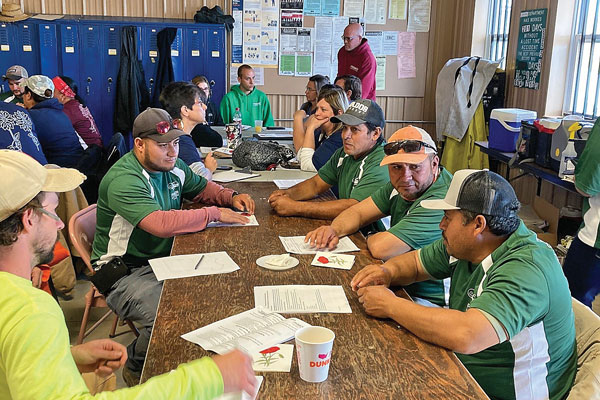3/1/2022
The Wisdom of the Crowd
Jennifer Zurko

Willoway’s Chief of Human Resources Emily Showalter will tell you that their company culture has been a work in progress. And developing it hasn’t exactly been smooth. “That’s not a word I would ever use,” laughs Emily.
Pictured: A teammate/co-worker helps another up during one of the annual soccer tournaments at Willoway’s company picnic.
But going through the process has been a valuable learning experience, and now they have a company culture that’s a mix of initiated and organic elements they continue to build upon.
“The Great Game of Business”
Ten years ago, as the industry was still dealing with the effects of The Great Recession, Willoway’s management team felt like the company was in a bit of a rut. They decided to survey their employees to gauge their attitudes and feelings toward the company, and the results were eye-opening.
“There were responses like, ‘Your communication is horrible. We don’t know what’s going on. We just get told what to do, we don’t know why we’re doing it,’” said Emily. “Everybody was just frustrated.”
She said the leadership team heard about a book titled “The Great Game of Business” (see sidebar), and once they read it, they realized the advice provided by the authors that worked for thousands of companies around the world could work for their nursery, too.
In the book, the authors talk about a new business system they refer to as “open-book management,” which focuses on top-down transparency from leadership and continuous engagement between management and employees.
Willoway made it a point to communicate more directly with the staff, creating what they call “Culture Teams” made up of 10% of the staff at any level from each department. Each Culture Team (there are six teams representing the company) is expected to meet for 15 minutes each week (they call them “Huddles”) and then report back what they heard and worked on at the weekly management meeting. The goal of these Huddles, said Emily, is to talk about how the company and employees are interacting and communicating with each other, what communication is missing, and whether everyone is working toward their core goals (see sidebar). It is NOT a place for the airing of grievances; problems are dealt with separately.
“I really think the turning point for the company culture was ‘The Great Game of Business’ and our focus on communication, transparency and having people focus more toward the same goal,” explained Emily. “I think before we did that everybody was going in so many different directions, not even knowing what the status of the company was. With the transparency, everybody has the same information. Everybody knows how the company is doing financially and we’re all rallied around the same goal, which is our profit.”
As a company that has been practicing open-book management for the last 10 years, Willoway shares its entire financial statement with every employee in the company. And because 300 of its 500 employees are native Spanish-speakers, every meeting, presentation and document is translated so that the information is communicated and received clearly. Most of these workers are hired through the H-2A visa program, but they’re just as involved as the non-seasonal employees, especially since many of them have been returning to Willoway for years.
 And Willoway also surveys their employees quarterly and measures their responses based on an engagement system that scores based on different drivers so the company can see exactly how it’s doing at different times of the year, what it’s doing well and where there needs to be improvement.
And Willoway also surveys their employees quarterly and measures their responses based on an engagement system that scores based on different drivers so the company can see exactly how it’s doing at different times of the year, what it’s doing well and where there needs to be improvement.
It’s all about the employees
The primary focus of open-book management is the employees and their morale. There are plenty of studies that show happier employees make for better, more productive employees, so it’s a formula that made sense to the Willoway leadership team.
Pictured: Willoway has “Culture Team Huddles” for 15 minutes every week to discuss communication and engagement with the staff.
As the employees were saying in the survey 10 years ago, they just want to know why they’re doing what they’re doing every day. Clearly communicating the company’s goals has been key in turning around their company culture.
“‘Understand the why’ is one of our seven core values and it’s a big one that we focus on,” said Emily. “We even have ‘Why Boxes’ around so employees can ask a question. If employees feel that they are able to even ask the question, they feel more comfortable, and like they’re part of the team and part of the family. The employees give us so much information that we as leadership don’t think about. The littlest thing can make such a big difference in morale.”
Willoway refers to this as “the wisdom of the crowd,” where the employees help provide the information leadership needs to make business decisions, regardless of how big or small.
Emily told a story that came from one of their Culture Huddles: At the start of the pandemic, managers asked employees what else the company could do to make them feel safer while working at the nursery. One of them asked if they could have their own individual water coolers to carry with them instead of using the big water jugs the company always provided. Emily said it was the simplest thing, and one with a simple solution, that never crossed the minds of leadership.
This is just one of many examples of why it’s important for the company to listen to its employees’ ideas and act on them, said Emily.
“Then they see, ‘Wow. I gave them this idea and now we’re all doing it,’” she said.
Emily said Willoway’s company culture has evolved and that they have to constantly work toward improving it. But a company’s culture also happens organically, where it reflects the values and goals of its leadership and employees.
“Culture is the beliefs and values of a group. To an extent, you really can’t change that,” explained Emily. “Willoway has an organic culture, but we feel that if something negative is impacting that culture, we can step in and change it. Our core values really mold that culture.”
As with everything that’s important and worthwhile, there are always challenges. But that’s how a successful company continues to move forward and grow. And that’s hard to do if you have unhappy employees.
“We say we need to roll out the red carpet for our staff,” said Emily. “We are so much more open-minded now. It’s so much easier and more natural to say, ‘Hey, we’re not checking the box in these places for our staff—what do we need to do?’
“The company doesn’t exist without the team. We need to be sure we’re always looking at those benchmarks and try to be better than average.”
Willoway’s 7 Core Values
1. Never Sacrifice Safety
2. Go the Extra Mile
3. Support the Team
4. Understand the Why
5. Take Ownership
6. Do the Right Thing
7. Play to Win!
“The Great Game of Business: The Only Sensible Way to Run a Company” by Jack Stack and Bo Burlingham started a business revolution by introducing the world to open-book management, a new way of running a business that created unprecedented profit and employee engagement. It wasn’t dreamed up in an executive think tank or an Ivy League business school or around the conference table by big-time consultants. It was forged on the factory floors of the heartland by ordinary folks hoping to figure out how to save their jobs when their parent company, International Harvester, went down the tubes.—Source: Amazon
Check out the new recruiting video, “Why Willoway,” that was created with help from business guru and speaker John Kennedy, who’s been part of many green industry event keynotes.